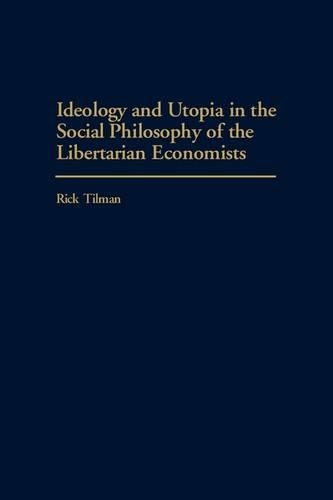
Ideology and Utopia in the Social Philosophy of the Libertarian Economists
(Hardback)
Publishing Details
Ideology and Utopia in the Social Philosophy of the Libertarian Economists
By (Author) Rick Tilman
Bloomsbury Publishing PLC
Praeger Publishers Inc
28th February 2001
United States
Classifications
Tertiary Education
Non Fiction
Economic theory and philosophy
330.1
Physical Properties
Hardback
224
Description
Challenging the libertarians' definition of freedom and democracy, this study portrays the social philosophy of Milton Friedman, James Buchanan, Friedrich Hayek, and George Stigler as the bulwark of an attack on welfare and regulatory state collectivism and as undermining majoritarian democracy, political and civil liberties, and social equality. The book opens with Frank Knight's doctrines and their impact on the Chicago laissez faire economists, places libertarianism within the American tradition of empirical collectivism, and explores Friedrich Hayek's road-to-serfdom thesis within the context of the New Deal. Posing problems of corporate power, it uses Friedman, Stigler, and Buchanan as examples of libertarian denial of these problems and, in a consideration of the debate between the New Left and Libertarian Right, contrasts their ideologies. The work concludes with a historical summing up that juxtaposes the recent past to the present, links libertarian material interests with the growth of corporate hegemony, and portrays the right wing of neoclassical economics as an intellectual bulwark of business culture. The emergent plutocracy that we now live in, including the erosion of democratic theory and practice, owes a significant part of its doctrinal and political sustenance to the influence of the free market economists who are the subject of this book. The study is the first to use the unpublished papers of libertarians James Buchanan, Gordon Tullock, Milton Friedman, and George Stigler to bring their interpretations of the meaning of freedom and democracy into question.
Reviews
Tilman's book is well researched and thoroughly documented.-Utopian Studies
"Tilman's book is well researched and thoroughly documented."-Utopian Studies
Author Bio
RICK TILMAN taught political economy and public policy at several universities in California and the Southwest until his recent retirement. He is the author of books and articles on C. Wright Mills, John Dewey, Thorstein Veblen, and Jacques Loeb. He is currently working on a a book on Veblen and his contemporaries, which will focus on placing Veblen in the intellectual history of the West.
